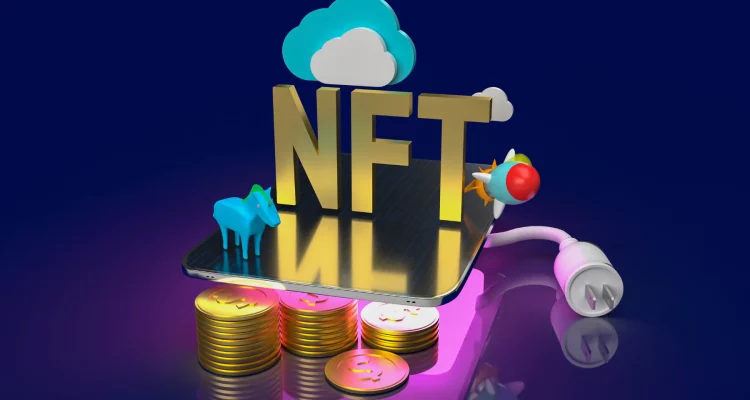Introduction
In recent years, Non-Fungible Tokens (NFTs) have taken the world by storm, primarily disrupting the art market by providing artists with a novel way to tokenize, sell, and authenticate digital art. With their unique properties—scarcity, ownership proof, and traceable provenance—NFTs have introduced an entirely new way to value and exchange digital goods.
However, the potential of NFTs extends far beyond art. While the art world has become the most prominent and visible application of NFTs, their underlying technology can be applied to many industries, from real estate to gaming to identity verification. The ability to represent ownership and authenticity of unique assets on the blockchain has opened up new possibilities in finance, gaming, supply chain management, real estate, and beyond.
This article explores the future applications of NFTs beyond the art market, highlighting their potential to revolutionize various sectors by enabling secure ownership, fractionalized assets, and increased interoperability.
What Are NFTs?
A Non-Fungible Token (NFT) is a type of digital asset that represents ownership or proof of authenticity of a unique item or piece of content, typically stored on a blockchain. Unlike cryptocurrencies such as Bitcoin or Ethereum, which are fungible and can be exchanged on a one-to-one basis, NFTs are unique and indivisible. This means that each NFT represents something distinct and cannot be replaced or exchanged for an identical item.
NFTs are often used for digital art, but they can represent a wide range of assets, including:
- Collectibles: Digital or physical items with intrinsic value, like rare trading cards or memorabilia.
- Virtual goods: Items in virtual worlds or video games, such as avatars, skins, and digital property.
- Real-world assets: Physical items or property that are tokenized for sale or ownership transfer.
- Intellectual property (IP): Licensing rights, patents, trademarks, or even media content.
What makes NFTs special is their ability to use blockchain technology to verify ownership and transaction history, which creates transparency and trust in an otherwise opaque market.
Potential Applications of NFTs Beyond Art
While the art market has been the primary domain for NFTs so far, their utility can extend across several industries. Below are some of the key areas where NFTs can potentially disrupt and innovate:
1. Gaming: Ownership of In-Game Assets
The gaming industry is one of the most promising fields for NFT adoption. Players often spend hours or even money acquiring in-game assets like skins, weapons, characters, or virtual land. However, most of these assets are confined within the gaming environment and cannot be traded or transferred to other platforms.
NFTs can bring real ownership to in-game assets. By tokenizing items like skins, characters, or even entire virtual worlds as NFTs, players would have the ability to:
- Trade and sell in-game assets across different platforms.
- Transfer assets between games, creating an interoperable ecosystem.
- Monetize rare in-game items, potentially earning income from their virtual possessions.
For example, in games like Axie Infinity or The Sandbox, players can buy, sell, or breed digital creatures, and each transaction is secured by NFTs. The rise of play-to-earn games and metaverse platforms has made NFTs a cornerstone of gaming’s future.
- Impact: NFTs enable true ownership of digital items, opening up a whole new economy for gamers, developers, and players alike.
2. Real Estate: Tokenizing Property Ownership
Real estate transactions are traditionally slow and cumbersome, often involving middlemen like brokers, banks, and notaries. NFTs have the potential to simplify these processes by tokenizing real estate properties, making them easier to buy, sell, and transfer.
- Fractional Ownership: NFTs allow for fractional ownership, meaning a single property can be divided into multiple tokens, enabling multiple investors to own portions of high-value assets. This makes real estate investment more accessible to the average person.
- Transparency: The ownership and transaction history of real estate properties could be securely stored and tracked on the blockchain, reducing the risks of fraud and disputes.
- Cross-Border Transactions: NFTs can facilitate seamless transactions across borders, making global real estate investments faster and easier. Blockchain’s decentralized nature ensures that all parties involved are working from the same ledger, minimizing the risk of errors or discrepancies.
- Example: Platforms like Propy are already working on tokenizing real estate assets and allowing property transactions through blockchain technology, which could involve NFTs as part of the transaction process.
- Impact: NFTs make real estate more liquid, accessible, and transparent, opening the door for global investment and fractionalized ownership.
3. Supply Chain and Provenance Tracking
Supply chains are often plagued with issues like fraud, counterfeit goods, and a lack of transparency. NFTs can offer a solution by enabling the tracking and verification of origin and provenance of products.
By assigning an NFT to each product or batch of products, companies can record all stages of the supply chain, from production to shipment to retail. These NFTs act as a digital passport that provides verified information about the product’s origin, quality, and authenticity. This could be particularly useful in industries where counterfeiting is a major concern, such as luxury goods, pharmaceuticals, and food.
- Example: A luxury brand like Louis Vuitton could use NFTs to ensure the authenticity of their products and prevent counterfeiting by linking each item with a unique NFT that tracks its journey from production to the final consumer.
- Impact: NFTs enhance transparency, accountability, and trust in supply chains, reducing fraud and improving consumer confidence in the quality of products.
4. Intellectual Property (IP) and Licensing
NFTs are perfectly suited for the digital representation of intellectual property (IP) rights. Musicians, writers, filmmakers, and other creators often face difficulties with licensing and royalties. NFTs can streamline the licensing process, providing creators with a new way to monetize their work and ensure they receive fair compensation.
- Example: A musician could issue an NFT for each song, which grants the buyer a license to use the song in a specific context. Every time the NFT is used, the blockchain would automatically execute royalty payments to the creator, making the process transparent and efficient.
- Impact: NFTs enable automated royalties and direct licensing, giving creators greater control over their work and ensuring that they are compensated fairly.
5. Identity and Credentials Verification
In an increasingly digital world, identity verification and credentialing have become critical concerns, especially in areas like online education, employment, and financial services. NFTs can help solve these problems by providing a secure and verifiable method for storing personal credentials.
For example, universities could issue NFTs as digital diplomas or certificates, ensuring that the information is tamper-proof and verifiable. Similarly, professional organizations could issue NFTs to represent licenses or certifications, reducing the risks of fraud and ensuring that only qualified individuals can access specific services.
- Example: The University of Nicosia in Cyprus has already issued digital diplomas as NFTs, allowing graduates to prove their academic credentials without the risk of forgery.
- Impact: NFTs enable secure and verifiable digital identity management, enhancing the trustworthiness of credentials and reducing fraud in various industries.

6. Event Ticketing and Access Control
NFTs can transform the way we think about ticketing for live events, concerts, sports, and festivals. Current ticketing systems are often susceptible to counterfeiting, scalping, and fraud, leading to a poor customer experience.
By issuing NFTs as event tickets, organizers can ensure that tickets are authentic, non-transferable, and linked to a specific individual. NFTs also enable programmable tickets with dynamic features such as:
- Access levels: Different ticket tiers (VIP, general admission, etc.) can be represented as different NFTs.
- Verified resale: Resale platforms can allow tickets to be transferred only via the official channels, reducing the secondary market exploitation.
- Fan engagement: NFTs can include digital memorabilia, exclusive content, or fan rewards for holders.
- Example: Major festivals like Coachella have experimented with NFT tickets, allowing users to access exclusive content and experiences through their NFT ticket.
- Impact: NFTs solve the issues of ticket fraud, counterfeit tickets, and scalping, providing a more secure, transparent, and fan-centric event experience.
Conclusion
NFTs have evolved far beyond their original use case in digital art and collectibles. Their unique ability to prove ownership, authenticity, and scarcity has opened up an array of potential applications across multiple industries. From gaming to real estate to intellectual property, NFTs are poised to revolutionize sectors by introducing greater transparency, security, and interoperability.
Although challenges such as scalability, regulatory uncertainty, and user education remain, the future of NFTs beyond the art market is bright. As blockchain technology continues to mature and more industries explore NFT integration, these digital assets will likely become an integral part of a wide variety of sectors, enabling new business models, enhanced ownership rights, and innovative ways to interact with the digital world.
In short, NFTs have the potential to reshape not just the art world, but a multitude of industries by redefining how we think about ownership, transactions, and value in the digital age.













































